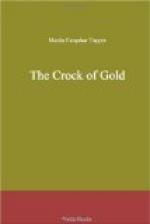“Come along with us, Master Acton, you’re wanted somewhere else; up, man, look alive, will you?”
And Roger dressed himself mechanically. It was no manner of use, not in the least worth while resisting, innocent though he was; his treasure had been found, and taken from him; he had nothing more to live for; his gold was gone—his god; where was the wisdom of fighting for any thing else; let them take him to prison if they would, to the jail, to the gallows, to any-whither, now his gold was gone. So he put on his clothes without a murmur, and went with them as quiet as a lamb.
Never was there a clearer case; the housekeeper’s hoard had been found in his possession, with a fragment of her shawl; and Sir John Vincent was very well aware of the mystery attending the old woman’s death; besides, he was in a great hurry to be off; for Pointer, and Silliphant, and Lord George Pypp, were to have a hurdle race with him that day, for a heavy bet; so he really had not time to go deep into the matter; and the result of five minutes’ talk before the magisterial chairs (Squire Ryle having been summoned to assist) was, that, on the accusation of Simon Jennings, Roger Acton was fully committed to the county jail, to be tried at next assizes, for Bridget Quarles’s murder.
Thank God! poor Roger, it has come to this. What other way than this was there to save thee from thy sin—to raise thee from thy fall? Where else, but in a prison, could you get the silent, solitary hours leading you again to wholesome thought and deep repentance? Where else could you escape the companionship of all those loose and low associates, sottish brawlers, ignorant and sensual unbelievers, vagabond radicals, and other lewd fellows of the baser sort, that had drank themselves drunk at your expense, and sworn to you as captain! The place, the time, the means for penitence are here. The crisis of thy destiny is come.
Honest Roger, Steady Acton, did I not see thy guardian angel—after all his many tears, aggrieved and broken spirit!—did I not see him lift his swollen eyes in gratitude to Heaven, and benevolence to thee, and smile a smile of hopeful joy when that damned crock was found?
Gladly could he thank his Lord, to behold the temptation at an end.
Did I not see the devil slink away from thee abashed, issuing like an adder from thy heart, and then, with a sudden Protean change, driven from thy hovel as a thunder-cloud dispersing, when Simon Jennings seized the jar, hugged it as his household-god—and took it home with him—and counted out the gold—and locked the bloody treasure in his iron-chest?
Fitly did the murderer lock up curses with his spoil.
And when God smote thine idol, dashing Dagon to the ground, and thy heart was sore with disappointment, and tender as a peeled fig—when hope was dead for earth, and conscience dared not look beyond it—ah! Roger, did I judge amiss when I saw, or thought I saw, those eyes full of humble shame, those lips quivering with remorseful sorrow?




